Analyzing the Impact of Social Norms on Environmental Conservation
VerifiedAdded on 2023/01/19
|6
|1360
|57
Report
AI Summary
This report delves into the significant impact of social norms on environmental conservation, using the example of hotel towel reuse programs. It explores how descriptive norms influence guest behavior and encourage participation in environmental initiatives. The study highlights the economic and environmental benefits of such programs, emphasizing the reduction of detergent-related pollutants and energy savings. The research investigates whether guests respond more to norms within their immediate surroundings (room-specific) compared to broader hotel-wide norms. It contrasts the application of social norms in controlled experiments with real-world scenarios, acknowledging the complexities that can dilute the impact of these norms. The report examines the effectiveness of different approaches to promoting towel reuse and encourages the adoption of sustainable practices within the hospitality industry. The report also references various academic studies and research papers that support the ideas presented.
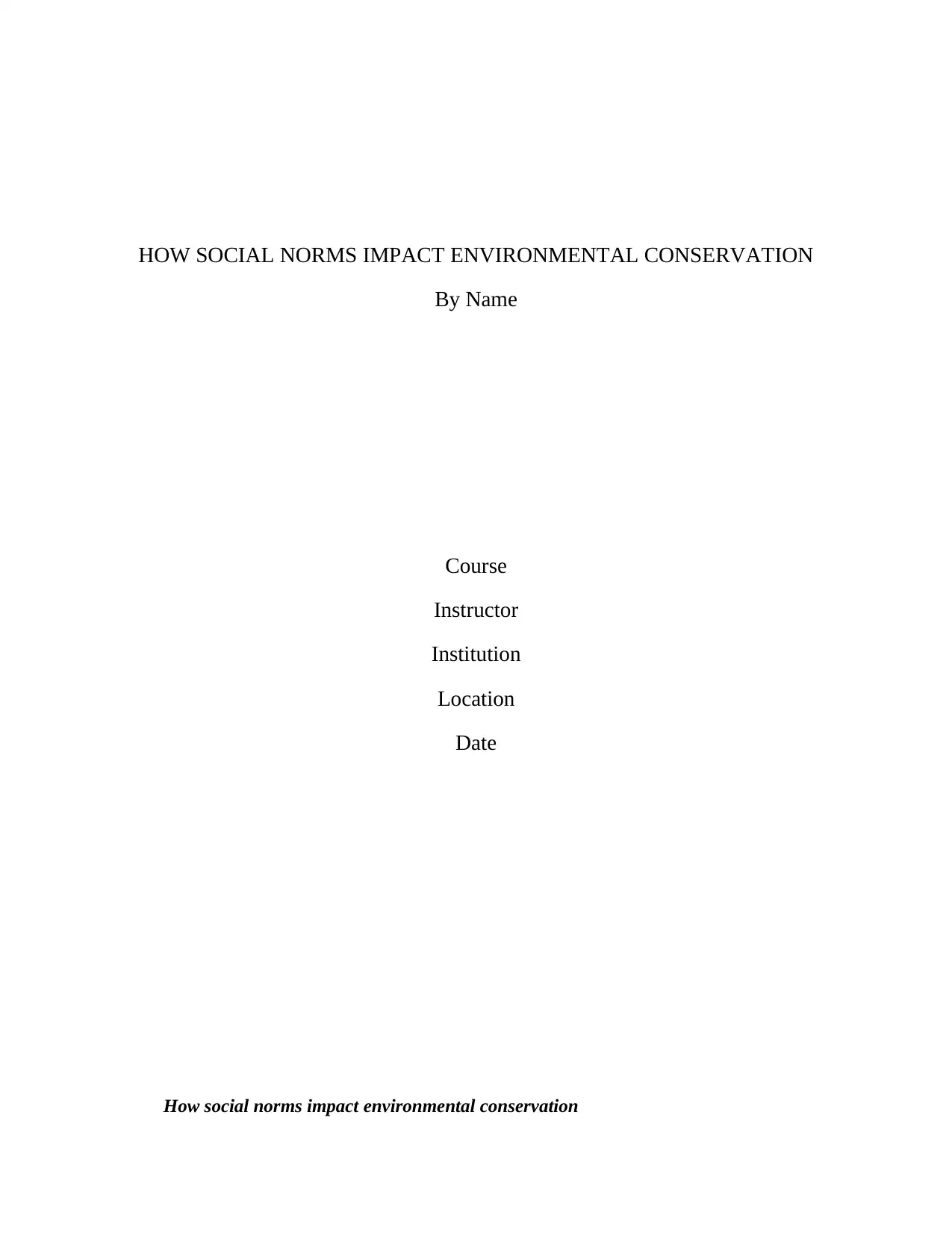
HOW SOCIAL NORMS IMPACT ENVIRONMENTAL CONSERVATION
By Name
Course
Instructor
Institution
Location
Date
How social norms impact environmental conservation
By Name
Course
Instructor
Institution
Location
Date
How social norms impact environmental conservation
Paraphrase This Document
Need a fresh take? Get an instant paraphrase of this document with our AI Paraphraser
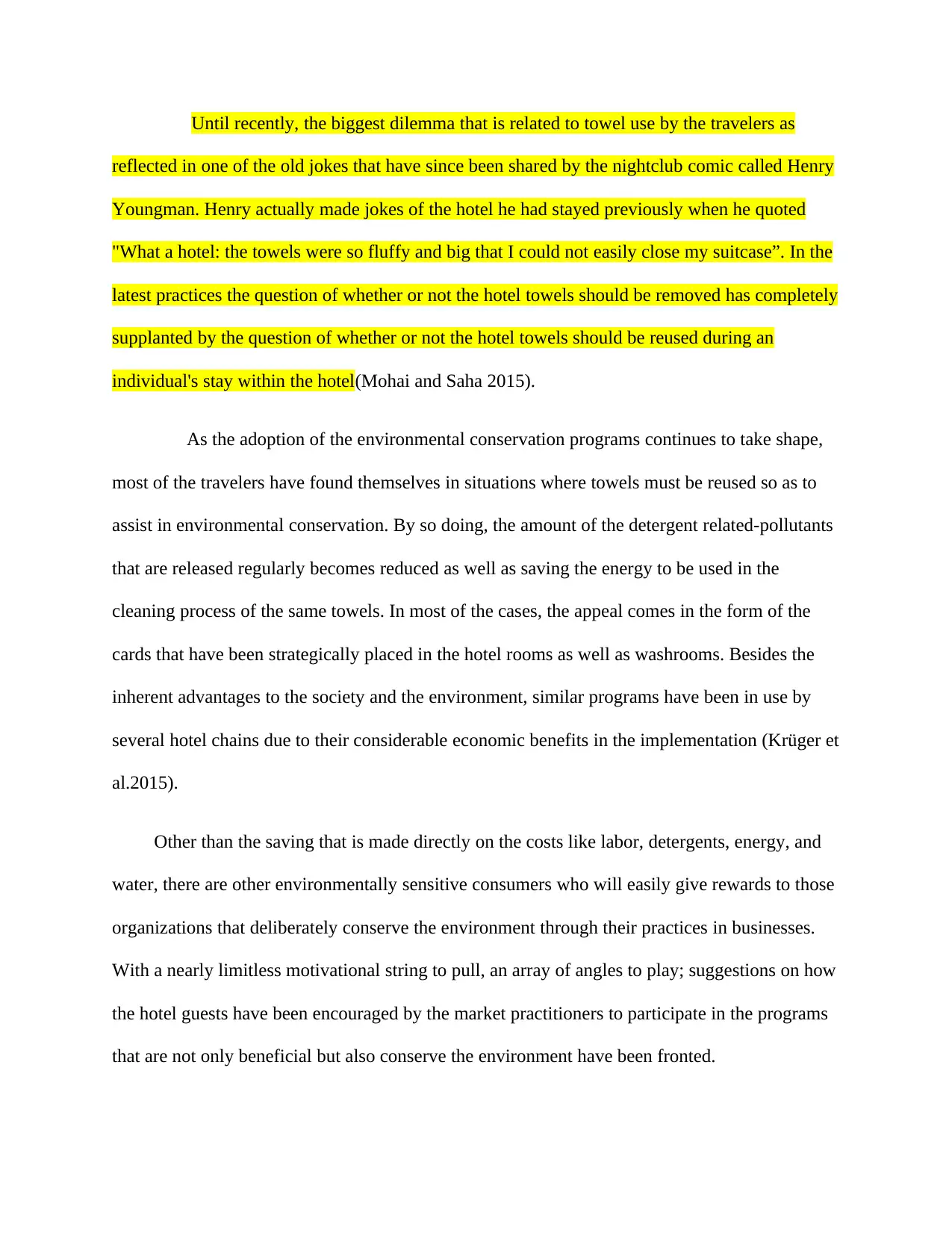
Until recently, the biggest dilemma that is related to towel use by the travelers as
reflected in one of the old jokes that have since been shared by the nightclub comic called Henry
Youngman. Henry actually made jokes of the hotel he had stayed previously when he quoted
"What a hotel: the towels were so fluffy and big that I could not easily close my suitcase”. In the
latest practices the question of whether or not the hotel towels should be removed has completely
supplanted by the question of whether or not the hotel towels should be reused during an
individual's stay within the hotel(Mohai and Saha 2015).
As the adoption of the environmental conservation programs continues to take shape,
most of the travelers have found themselves in situations where towels must be reused so as to
assist in environmental conservation. By so doing, the amount of the detergent related-pollutants
that are released regularly becomes reduced as well as saving the energy to be used in the
cleaning process of the same towels. In most of the cases, the appeal comes in the form of the
cards that have been strategically placed in the hotel rooms as well as washrooms. Besides the
inherent advantages to the society and the environment, similar programs have been in use by
several hotel chains due to their considerable economic benefits in the implementation (Krüger et
al.2015).
Other than the saving that is made directly on the costs like labor, detergents, energy, and
water, there are other environmentally sensitive consumers who will easily give rewards to those
organizations that deliberately conserve the environment through their practices in businesses.
With a nearly limitless motivational string to pull, an array of angles to play; suggestions on how
the hotel guests have been encouraged by the market practitioners to participate in the programs
that are not only beneficial but also conserve the environment have been fronted.
reflected in one of the old jokes that have since been shared by the nightclub comic called Henry
Youngman. Henry actually made jokes of the hotel he had stayed previously when he quoted
"What a hotel: the towels were so fluffy and big that I could not easily close my suitcase”. In the
latest practices the question of whether or not the hotel towels should be removed has completely
supplanted by the question of whether or not the hotel towels should be reused during an
individual's stay within the hotel(Mohai and Saha 2015).
As the adoption of the environmental conservation programs continues to take shape,
most of the travelers have found themselves in situations where towels must be reused so as to
assist in environmental conservation. By so doing, the amount of the detergent related-pollutants
that are released regularly becomes reduced as well as saving the energy to be used in the
cleaning process of the same towels. In most of the cases, the appeal comes in the form of the
cards that have been strategically placed in the hotel rooms as well as washrooms. Besides the
inherent advantages to the society and the environment, similar programs have been in use by
several hotel chains due to their considerable economic benefits in the implementation (Krüger et
al.2015).
Other than the saving that is made directly on the costs like labor, detergents, energy, and
water, there are other environmentally sensitive consumers who will easily give rewards to those
organizations that deliberately conserve the environment through their practices in businesses.
With a nearly limitless motivational string to pull, an array of angles to play; suggestions on how
the hotel guests have been encouraged by the market practitioners to participate in the programs
that are not only beneficial but also conserve the environment have been fronted.
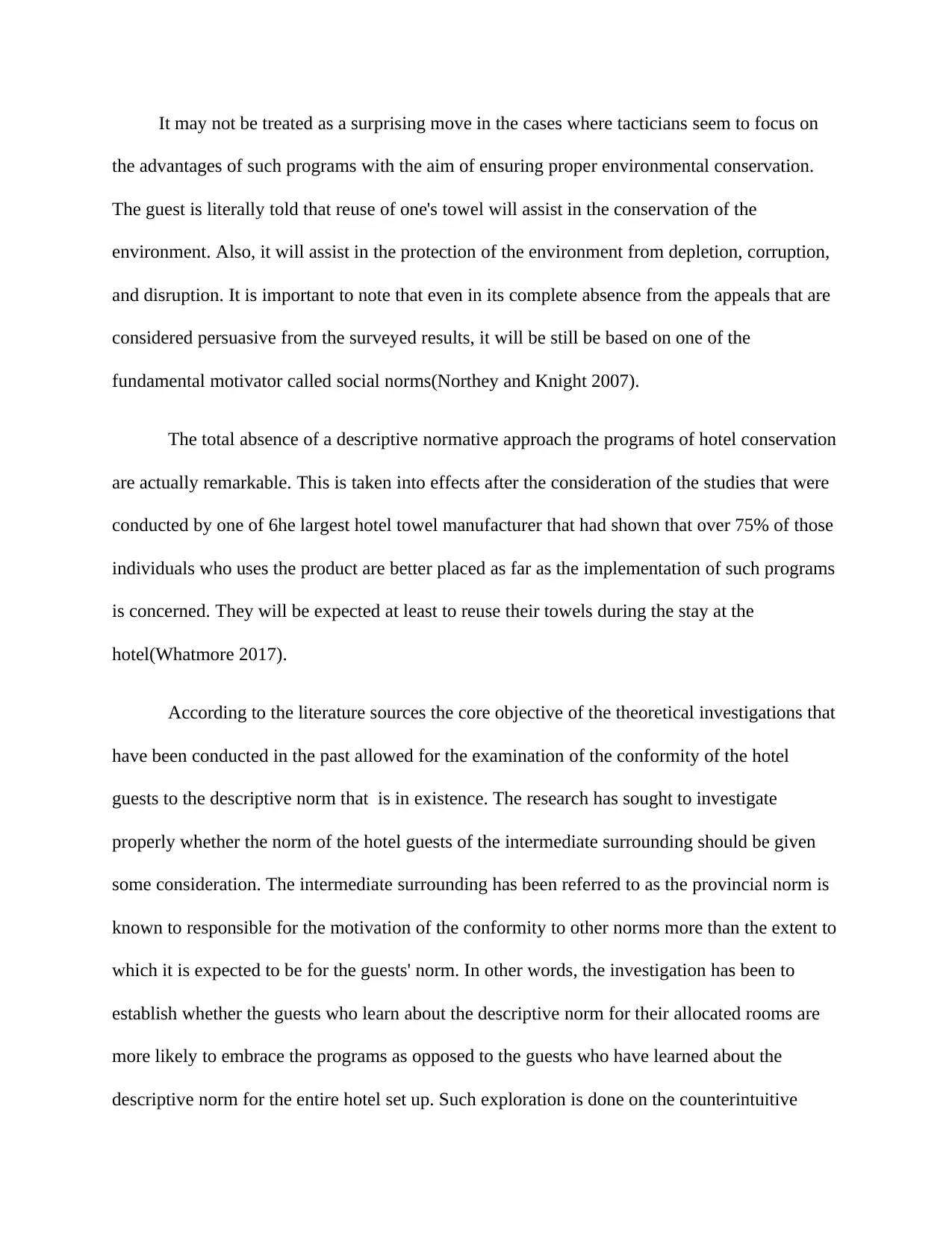
It may not be treated as a surprising move in the cases where tacticians seem to focus on
the advantages of such programs with the aim of ensuring proper environmental conservation.
The guest is literally told that reuse of one's towel will assist in the conservation of the
environment. Also, it will assist in the protection of the environment from depletion, corruption,
and disruption. It is important to note that even in its complete absence from the appeals that are
considered persuasive from the surveyed results, it will be still be based on one of the
fundamental motivator called social norms(Northey and Knight 2007).
The total absence of a descriptive normative approach the programs of hotel conservation
are actually remarkable. This is taken into effects after the consideration of the studies that were
conducted by one of 6he largest hotel towel manufacturer that had shown that over 75% of those
individuals who uses the product are better placed as far as the implementation of such programs
is concerned. They will be expected at least to reuse their towels during the stay at the
hotel(Whatmore 2017).
According to the literature sources the core objective of the theoretical investigations that
have been conducted in the past allowed for the examination of the conformity of the hotel
guests to the descriptive norm that is in existence. The research has sought to investigate
properly whether the norm of the hotel guests of the intermediate surrounding should be given
some consideration. The intermediate surrounding has been referred to as the provincial norm is
known to responsible for the motivation of the conformity to other norms more than the extent to
which it is expected to be for the guests' norm. In other words, the investigation has been to
establish whether the guests who learn about the descriptive norm for their allocated rooms are
more likely to embrace the programs as opposed to the guests who have learned about the
descriptive norm for the entire hotel set up. Such exploration is done on the counterintuitive
the advantages of such programs with the aim of ensuring proper environmental conservation.
The guest is literally told that reuse of one's towel will assist in the conservation of the
environment. Also, it will assist in the protection of the environment from depletion, corruption,
and disruption. It is important to note that even in its complete absence from the appeals that are
considered persuasive from the surveyed results, it will be still be based on one of the
fundamental motivator called social norms(Northey and Knight 2007).
The total absence of a descriptive normative approach the programs of hotel conservation
are actually remarkable. This is taken into effects after the consideration of the studies that were
conducted by one of 6he largest hotel towel manufacturer that had shown that over 75% of those
individuals who uses the product are better placed as far as the implementation of such programs
is concerned. They will be expected at least to reuse their towels during the stay at the
hotel(Whatmore 2017).
According to the literature sources the core objective of the theoretical investigations that
have been conducted in the past allowed for the examination of the conformity of the hotel
guests to the descriptive norm that is in existence. The research has sought to investigate
properly whether the norm of the hotel guests of the intermediate surrounding should be given
some consideration. The intermediate surrounding has been referred to as the provincial norm is
known to responsible for the motivation of the conformity to other norms more than the extent to
which it is expected to be for the guests' norm. In other words, the investigation has been to
establish whether the guests who learn about the descriptive norm for their allocated rooms are
more likely to embrace the programs as opposed to the guests who have learned about the
descriptive norm for the entire hotel set up. Such exploration is done on the counterintuitive
⊘ This is a preview!⊘
Do you want full access?
Subscribe today to unlock all pages.

Trusted by 1+ million students worldwide
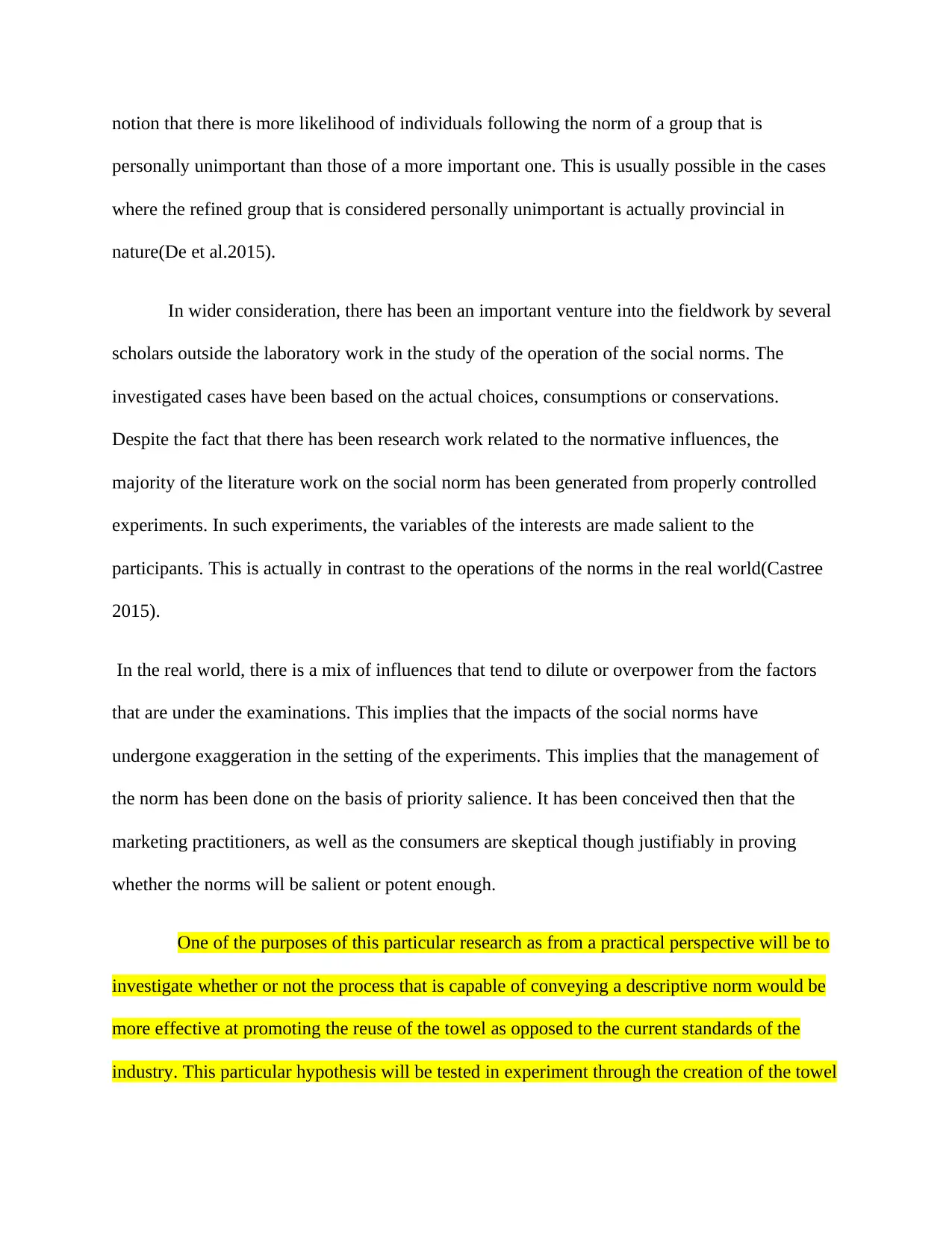
notion that there is more likelihood of individuals following the norm of a group that is
personally unimportant than those of a more important one. This is usually possible in the cases
where the refined group that is considered personally unimportant is actually provincial in
nature(De et al.2015).
In wider consideration, there has been an important venture into the fieldwork by several
scholars outside the laboratory work in the study of the operation of the social norms. The
investigated cases have been based on the actual choices, consumptions or conservations.
Despite the fact that there has been research work related to the normative influences, the
majority of the literature work on the social norm has been generated from properly controlled
experiments. In such experiments, the variables of the interests are made salient to the
participants. This is actually in contrast to the operations of the norms in the real world(Castree
2015).
In the real world, there is a mix of influences that tend to dilute or overpower from the factors
that are under the examinations. This implies that the impacts of the social norms have
undergone exaggeration in the setting of the experiments. This implies that the management of
the norm has been done on the basis of priority salience. It has been conceived then that the
marketing practitioners, as well as the consumers are skeptical though justifiably in proving
whether the norms will be salient or potent enough.
One of the purposes of this particular research as from a practical perspective will be to
investigate whether or not the process that is capable of conveying a descriptive norm would be
more effective at promoting the reuse of the towel as opposed to the current standards of the
industry. This particular hypothesis will be tested in experiment through the creation of the towel
personally unimportant than those of a more important one. This is usually possible in the cases
where the refined group that is considered personally unimportant is actually provincial in
nature(De et al.2015).
In wider consideration, there has been an important venture into the fieldwork by several
scholars outside the laboratory work in the study of the operation of the social norms. The
investigated cases have been based on the actual choices, consumptions or conservations.
Despite the fact that there has been research work related to the normative influences, the
majority of the literature work on the social norm has been generated from properly controlled
experiments. In such experiments, the variables of the interests are made salient to the
participants. This is actually in contrast to the operations of the norms in the real world(Castree
2015).
In the real world, there is a mix of influences that tend to dilute or overpower from the factors
that are under the examinations. This implies that the impacts of the social norms have
undergone exaggeration in the setting of the experiments. This implies that the management of
the norm has been done on the basis of priority salience. It has been conceived then that the
marketing practitioners, as well as the consumers are skeptical though justifiably in proving
whether the norms will be salient or potent enough.
One of the purposes of this particular research as from a practical perspective will be to
investigate whether or not the process that is capable of conveying a descriptive norm would be
more effective at promoting the reuse of the towel as opposed to the current standards of the
industry. This particular hypothesis will be tested in experiment through the creation of the towel
Paraphrase This Document
Need a fresh take? Get an instant paraphrase of this document with our AI Paraphraser
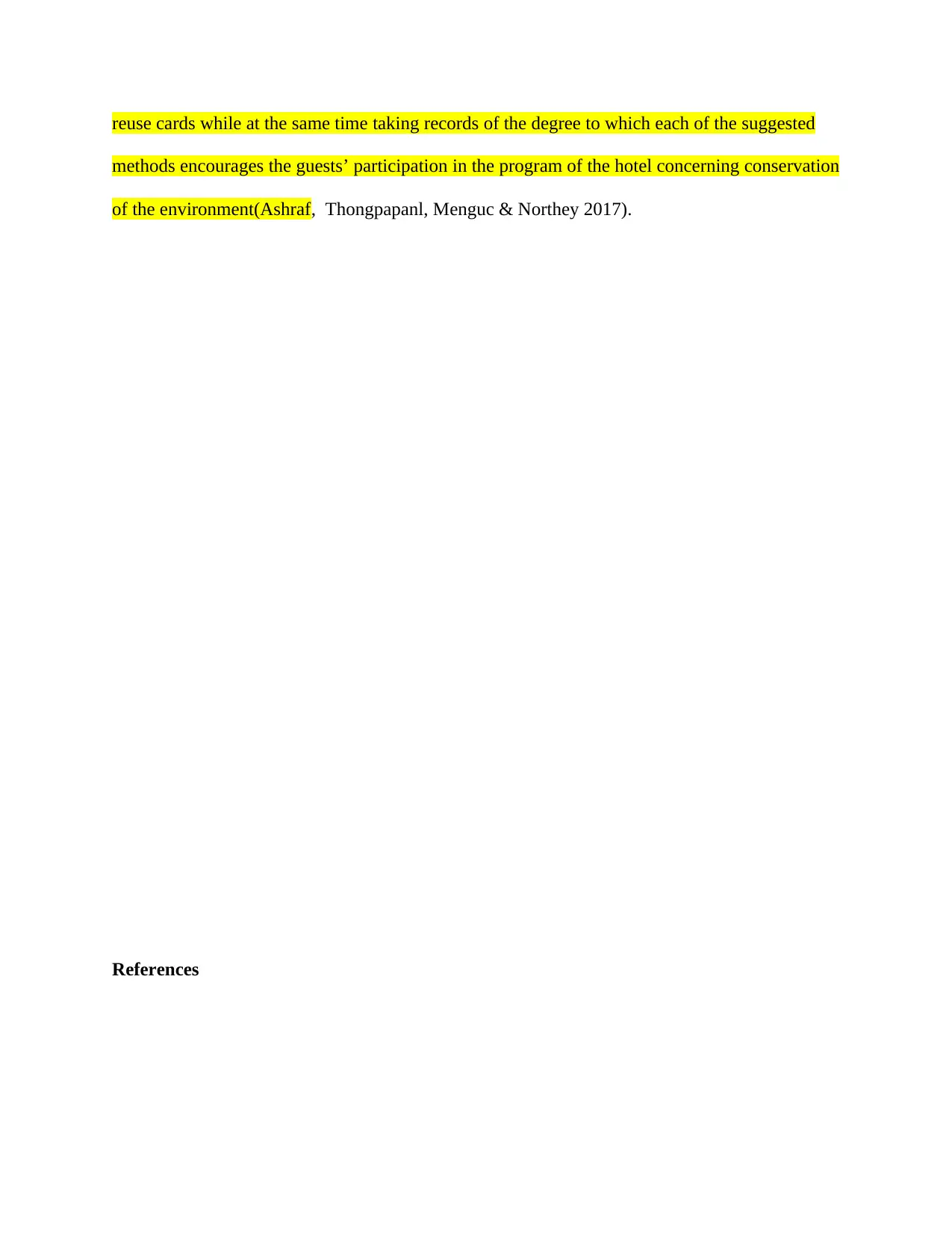
reuse cards while at the same time taking records of the degree to which each of the suggested
methods encourages the guests’ participation in the program of the hotel concerning conservation
of the environment(Ashraf, Thongpapanl, Menguc & Northey 2017).
References
methods encourages the guests’ participation in the program of the hotel concerning conservation
of the environment(Ashraf, Thongpapanl, Menguc & Northey 2017).
References
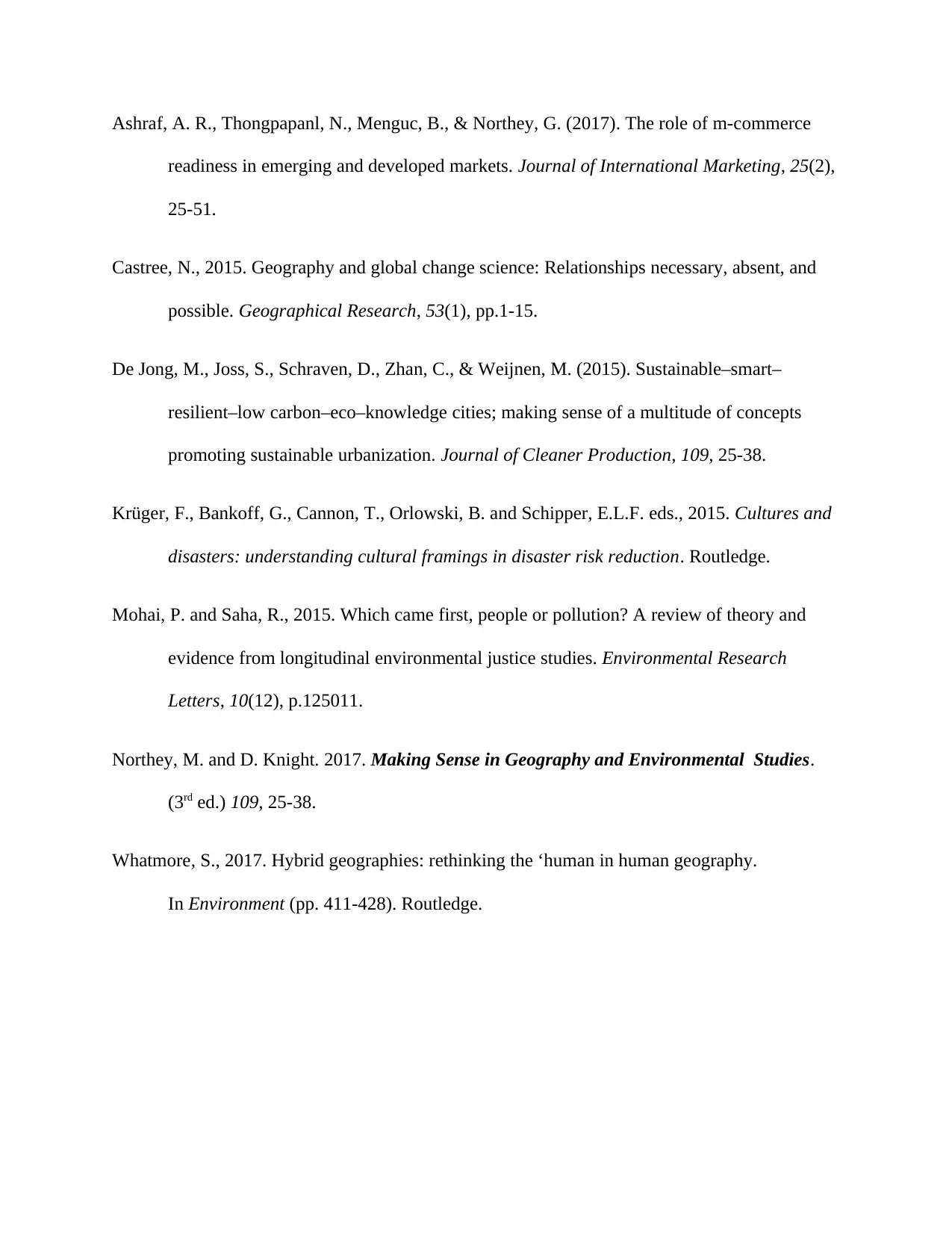
Ashraf, A. R., Thongpapanl, N., Menguc, B., & Northey, G. (2017). The role of m-commerce
readiness in emerging and developed markets. Journal of International Marketing, 25(2),
25-51.
Castree, N., 2015. Geography and global change science: Relationships necessary, absent, and
possible. Geographical Research, 53(1), pp.1-15.
De Jong, M., Joss, S., Schraven, D., Zhan, C., & Weijnen, M. (2015). Sustainable–smart–
resilient–low carbon–eco–knowledge cities; making sense of a multitude of concepts
promoting sustainable urbanization. Journal of Cleaner Production, 109, 25-38.
Krüger, F., Bankoff, G., Cannon, T., Orlowski, B. and Schipper, E.L.F. eds., 2015. Cultures and
disasters: understanding cultural framings in disaster risk reduction. Routledge.
Mohai, P. and Saha, R., 2015. Which came first, people or pollution? A review of theory and
evidence from longitudinal environmental justice studies. Environmental Research
Letters, 10(12), p.125011.
Northey, M. and D. Knight. 2017. Making Sense in Geography and Environmental Studies.
(3rd ed.) 109, 25-38.
Whatmore, S., 2017. Hybrid geographies: rethinking the ‘human in human geography.
In Environment (pp. 411-428). Routledge.
readiness in emerging and developed markets. Journal of International Marketing, 25(2),
25-51.
Castree, N., 2015. Geography and global change science: Relationships necessary, absent, and
possible. Geographical Research, 53(1), pp.1-15.
De Jong, M., Joss, S., Schraven, D., Zhan, C., & Weijnen, M. (2015). Sustainable–smart–
resilient–low carbon–eco–knowledge cities; making sense of a multitude of concepts
promoting sustainable urbanization. Journal of Cleaner Production, 109, 25-38.
Krüger, F., Bankoff, G., Cannon, T., Orlowski, B. and Schipper, E.L.F. eds., 2015. Cultures and
disasters: understanding cultural framings in disaster risk reduction. Routledge.
Mohai, P. and Saha, R., 2015. Which came first, people or pollution? A review of theory and
evidence from longitudinal environmental justice studies. Environmental Research
Letters, 10(12), p.125011.
Northey, M. and D. Knight. 2017. Making Sense in Geography and Environmental Studies.
(3rd ed.) 109, 25-38.
Whatmore, S., 2017. Hybrid geographies: rethinking the ‘human in human geography.
In Environment (pp. 411-428). Routledge.
⊘ This is a preview!⊘
Do you want full access?
Subscribe today to unlock all pages.

Trusted by 1+ million students worldwide
1 out of 6
Your All-in-One AI-Powered Toolkit for Academic Success.
+13062052269
info@desklib.com
Available 24*7 on WhatsApp / Email
![[object Object]](/_next/static/media/star-bottom.7253800d.svg)
Unlock your academic potential
Copyright © 2020–2026 A2Z Services. All Rights Reserved. Developed and managed by ZUCOL.
